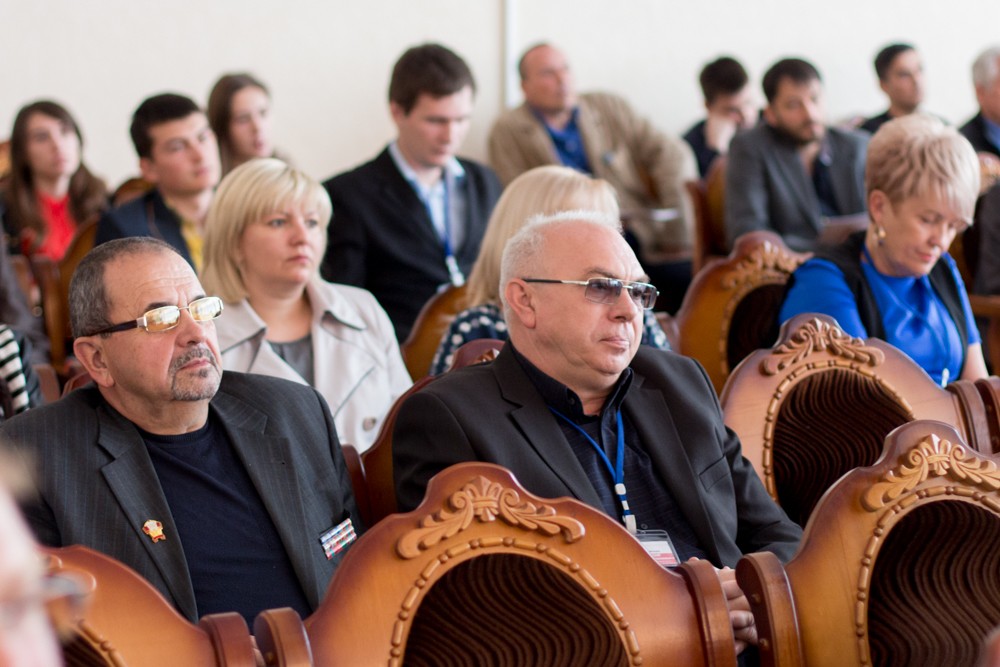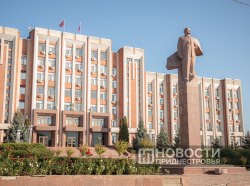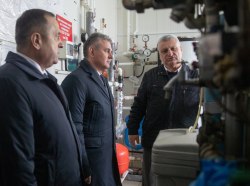Tiraspol, 19 May. /Novosti Pridnestrovya/. The 4th Pridnestrovian Investment Economic forum is taking place in Tiraspol. One of its discussion platforms centres on the problem of Pridnestrovie's current tax system and the advisability of adopting a new one.
Among the guests who shared their vision of the situation in the tax and fiscal sphere were the deputy minister of economic development of the PMR, Natalya Sokolova, the chairman of the Supreme Council's committee on economic policy, Alexander Martynov, the financial director of Floare, Svetlana Zhivotova. the deputy director of Kishinev's Centre of Strategic Studies and Reforms, Yelena Gorelova, an associate professor at the economics department of Shevchenko PSU, Ivan Uzun. The moderator of the discussion was the head of the Finance and Credit chair of PSU's economics department, Yury Safronov.
In 2002 Pridnestrovie had adopted the so-called classic tax system providing for income tax, property tax, corporate property tax, value added tax and corporate tax. As of today it is this item which brings about 20% of revenues to the state coffers.
All participants agreed the objective necessity of a tax reform was long overdue. But their opinions diverged as for the details, urgency and the method of the reform.
According to Natalya Sokolova, one of the disadvantages of the current tax system is its multi-stage structure: the corporate tax is levied at almost every production stage, thus accumulating the tax burden.
«Someone has produced certain raw material for the subsequent resale and involvement into another production cycle and pays income tax; at the next production stage the manufacturer also pays income tax," noted Sokolova.
According to the deputy minister, this tax system is a rare phenomenon in world practice, and in most countries indirect taxes are levied instead.
Another disadvantage of the system, according to Sokolova, is irregular distribution of tax burden among various sectors of economy and increased tax burden on production.
«The current tax system does not contribute to the development of our manufacturers, nor does it yield sufficient revenues to the state budget as we have a huge budget gap today," said the deputy minister.
According to Sokolova, under present circumstances the government is seeking ways of reducing budget deficit. Besides, Pridnestrovie cannot use the simplest mechanism — an increase of the current tax rates as the tax burden has been increasing for several years, and further tax rise will deal a considerable blow to the country's economic entities.
«Another argument is the expansion of production and entrepreneurial basis," said Sokolova.
To achieve such economic growth and consequently increased budget revenues, the government has to apply certain stimulus measures, one of which, according to Sokolova, may be a tax reform, in other words, the adoption of the previous classical system.
«That same value added tax does not apply to exports, thus stimulating export-driven enterprises. It stimulates industrial enterprises by being compensated with every sale," said Sokolova, adding that the classic taxation system is, as a rule, employed by the states with which the PMR has trading relations and hence is more comprehensible for their economic entities, which must boost an investment flow to Pridnestrovie.
According to Alexander Martynov, despite the objective disadvantages of the current taxation system, it is rather premature to conduct this reform.
«The problem lies in the absence of a compromise between bodies of power over macroeconomics and the problem of budget and tax policy because budget and tax policy is not a tax name and tax type — this refers to the size of economic tax burden," underscored Alexander Martynov.
According to him, before seeking an optimal tax instrument, it is necessary to determine the tax amount. In the meantime, according to Martynov, in order to attract investment to the PMR, Pridnestrovie's taxes should be lower than that in neighbouring countries. This aims to assure a higher level of investment profitability, which in turn will compensate for investors' risks arisen from Pridnestrrovie's unrecognised status. But such a reduction in taxes will require the compensation for budget shortfalls. According to Alexander Martynov, such fund sources are either foreign financial assistance or the growth of the national debt. The deputy, however, did not clarify what he meant.
Also, according to Martynov, the adoption of the classical system may result in problems with the return of VAT to manufacturers selling their goods abroad, which was the reason of adopting income tax in 2002.
Yelena Gorelova argued that the main source of discord between the executive and legislative power was the fact that the calculations both sides are using were not quite accurate.
«Unfortunately, there are no qualitative assessments one can trust and, based on which, it would be possible to decide whether to launch the reform or not," said the expert, adding that the figures testifying to the extensive tax burden on Pridnestrovie's economy derived from a slightly inaccurate method of calculating the country's GDP, excluding «grey» and «shadow» sectors of economy. If these factors had been taken into account, the problem would deem less pessimistic. Nevertheless, according to the expert, the tax reform should be conducted in Pridnestrovie.
Svetlana Zhivotova stated that, according to Floare's management, the current tax system was unfair at least in the footwear industry in which the income tax rate is twice as high as applied to industrial enterprises in general and thrice as high as in the light industry. Zhivotova put forward manufacturers' initiative to enable enterprises to voluntarily adopt the classic system in 2017, with paying corporate property and profit tax instead of income tax, but without levying VAT on them.












